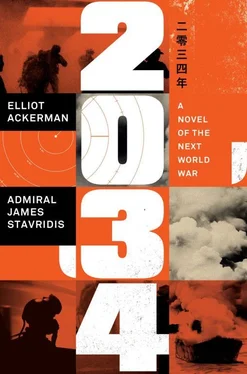“There,” she said, pointing off their bow.
Calls soon came in from the Levin and the Hoon confirming visuals on two, then three, and finally a fourth and fifth ship. All People’s Liberation Army naval vessels, and they ranged in size from a frigate up to a carrier, the hulking Zheng He , which was as formidable as anything in the US Navy’s Seventh Fleet. The Chinese ships formed in a circle around Hunt’s command, which itself had encircled the Wén Rui , so that the two flotillas were arrayed in two concentric rings, rotating in opposite directions.
A radioman positioned in a corner of the bridge wearing a headset began to emphatically gesture for Hunt. “What is it?” she asked the sailor, who handed her the headset. Over the analog hum of static, she could hear a faint voice: “US Naval Commander, this is Rear Admiral Ma Qiang, commander of the Zheng He Carrier Battle Group. We demand you release the civilian vessel you have captured. Depart our territorial waters immediately….” There was a pause, then the message repeated. Hunt wondered how many times this request had been spoken into the ether, and how many times it would be allowed to go unanswered before the attendant battle group—which seemed to be drawing ever closer—took action.
“Can you get a secure VoIP connection with Seventh Fleet Headquarters?” Hunt asked the radioman, who nodded and then began reconfiguring red and blue wires into the back of an old-fashioned laptop normally used on the quiet midwatches for video games; it was primitive and so perhaps a more secure way to connect.
“What do they want?” asked Morris, who was staring vacantly at the ring of six ships that surrounded them.
“They want that fishing trawler back,” said Hunt. “Or, rather, whatever technology is on it, and they want us out of these waters.”
“What’s our move?”
“I don’t know yet,” answered Hunt, who glanced over at the radioman, who was toggling the VoIP switch, checking it for a dial tone. While she waited, her leg began to ache from the activity of climbing around the ship. She reached in her pocket, rubbed the ache, and felt the letter from the medical board. “You got me Seventh Fleet yet?” she asked.
“Not yet, ma’am.”
Hunt glanced impatiently at her watch. “Christ, then call the Levin or the Hoon . See if they can raise them.”
The radioman glanced back at her, wide-eyed, as if searching within himself for the courage to say something he couldn’t quite bear to say.
“What is it?” asked Hunt.
“I’ve got nothing.”
“What do you mean, you’ve got nothing?” Hunt glanced at Morris, who appeared equally unnerved.
“All of our communications are down,” said the radioman. “I can’t raise the Levin , or the Hoon…. I’ve got nobody.”
Hunt unclipped the handheld radio she had fastened to her belt, the one she’d been using to communicate with the bridge when she’d been belowdecks on the Wén Rui. She keyed and unkeyed the handset. “Can you get up on any channel?” Hunt asked, betraying for the first time the slightest tinge of desperation in her voice.
“Only this one,” said the radioman, who raised the earphones he’d been listening to, which relayed a message on a loop:
“US Naval Commander, this is Rear Admiral Ma Qiang, commander of the Zheng He Carrier Battle Group. We demand you release the civilian vessel you have captured. Depart our territorial waters immediately….”

14:22 March 12, 2034 (GMT+4:30)
Strait of Hormuz
All the screens in the cockpit were out. The avionics. The weapons. The navigation. All of it—dark. Wedge’s communications had gone silent a few minutes before, which had left him feeling a remarkable sense of calm. No one from the Bush was calling. It was just him, up here, with an impossible problem. The plane was still flying itself. Or, rather, it was being flown by unseen forces who were smoothly and carefully maneuvering the jet. His descent had stalled. By his estimation, he was cruising at around five thousand feet. His speed was steady, five hundred, maybe five hundred and fifty knots. And he was circling.
He pulled from his flight bag the tablet on which he’d downloaded all the regional charts. He also checked the compass on his watch, the Breitling chronometer that had belonged to his father. Referencing the compass and the tablet together, it didn’t take him long to calculate exactly where he was, which was directly above Bandar Abbas, the site of the massive Iranian military installation that guarded the entrance to the Arabian Gulf. Or the Persian Gulf, as they call it, thought Wedge. He watched the parched land below slowly rotate as he flew racetracks in the airspace.
There was, of course, the off chance that this override of his aircraft was due to some freak malfunction in the F-35. But those odds were long and running longer with each minute that passed. What was far more probable, as Wedge saw it, was that his mission had been compromised, the controls of his plane hacked, and he himself turned into a passenger on this flight that he increasingly believed would end with him on the ground in Iranian territory.
Time was short; he would be out of fuel within the hour. He had one choice.
It likely meant he wouldn’t be smoking a celebratory Marlboro on the fantail of the Bush anytime soon. So, he reached between his legs, to the black-and-yellow striped handle, which was primed to the rocket in his ejection seat. This is it , he nearly said aloud, as he thought of his father, grandfather, and great-grandfather, all in the single instant it took him to pull the handle.
But nothing happened.
His ejector seat had been disabled too.
The engine on the F-35 let out a slight, decelerating groan. His plane began to cast off altitude, corkscrewing its descent into Bandar Abbas. One last time, Wedge stamped on the rudder pedals, pushed and then pulled the throttle, and tugged on the stick. He then reached under his flight vest, to where he carried his pistol. He grabbed it by its barrel, so that in his grip he wielded it like a hammer. And as his aircraft entered its glide path toward the runway, Wedge began to tear apart the inside of his cockpit, doing his best to destroy the sensitive items it contained, beginning with the small black box situated behind his head. This entire time, it hadn’t stopped its humming.

08:32 March 12, 2034 (GMT-4)
Washington, D.C.
Air Force One, with the president on board, was slicing across the Atlantic on its way back from the G7 summit, its last round of meetings having been curtailed due to the burgeoning crisis. Touchdown at Andrews was scheduled for 16:37 local time, more than an hour after Chowdhury had sworn to his mother that he’d be home to facilitate his daughter’s pickup with his ex-wife. Taking a reprieve from one crisis, he stepped outside the Situation Room and turned on his cell phone to deal with another.
“Sandeep, I refuse to stand in the same room as that woman,” answered his mother as soon as Chowdhury had explained. He pleaded for her help. When she asked for the details of what was holding him up he couldn’t say, recalling Lin Bao’s familiarity with his texts. His mother continued to protest. In the end, however, Chowdhury insisted on remaining at work, adding, lamely, that it was “a matter of national security.”
He hung up the phone and returned to the Situation Room. Hendrickson and his two aides sat on one side of the conference table, staring blankly at the opposite wall. Lin Bao had called, delivering news that had yet to filter from the George H. W. Bush , through Fifth Fleet Headquarters in Bahrain, up to Central Command, and then to the White House: the Iranian Revolutionary Guards had taken control of an F-35 transiting their airspace, hacking into its onboard computer to bring it down.
Читать дальше













